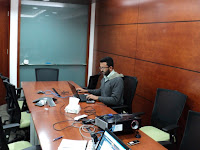Talking via a translator
Giving a demo to an audience always requires some preparation. Even if it is only one member in the audience, it matters a lot because the impression the person would have depends on how you are doing.
As it is, it is difficult to give a presentation or market an idea to another person. Add to that the language barrier and the mix gets interesting. Well, I had my first experience with such a mix a couple of days back when I gave a presentation of the proof of concept that we were working on. My colleague from China acting as the translator for the presentation. He had already instructed me to go slow since it would otherwise be difficult for him to keep up and translate. Having no experience in this and no chance for a rehearsal, we dived in.
The important thing for me was to keep track of what I was saying. Speaking slow and having to pause in between, I needed to keep my attention on where I was more than usual. My colleague would say the gist of what I had said and then tell me if the client had any comments or questions thus far. Although my colleague was technically sound, it still is frustrating that I cannot understand the client directly. Then there is this nagging sense of doubt if the translation actually tells me the complete story. Of course, I knew that my colleague would be trying his best at getting the requirements himself, but it was not still the same as first hand.
At times, when there are lengthier discussions between the client and my colleague, there are chances that I could drift off and think about some other things. So even though I don't understand what they are talking about, I still keep my attention on their voice. This helps me to focus and many times I can get the English jargons that come up which at least gives a sense of what subject they are on and can help me to prepare for any questions that come next. Sometime even voice modulations themselves can tell us certain things.
In between all this, there was an incident where the client went on talking for a couple of minutes or more and the translation from my colleague ended in like 10 seconds. I almost could feel like what Bill Murray's character, Bob Harris, would have felt in the movie Lost in Translation. There was this sequence where the Photographer is speaking to the translator with a lot of emotion about what he wants Bob to be doing. After listening to the long speech, she turns to an expectant Bob and translates "He want you to turn and look in camera. Okay?" And Bob is like.. Thats it? Is that all he said?
Although in requirement gathering, there are many things "lost in translation". Remember the cartoon about the swing customer wanted? Well, for my own sake I sure hope there is nothing lost in translation here.
As it is, it is difficult to give a presentation or market an idea to another person. Add to that the language barrier and the mix gets interesting. Well, I had my first experience with such a mix a couple of days back when I gave a presentation of the proof of concept that we were working on. My colleague from China acting as the translator for the presentation. He had already instructed me to go slow since it would otherwise be difficult for him to keep up and translate. Having no experience in this and no chance for a rehearsal, we dived in.
The important thing for me was to keep track of what I was saying. Speaking slow and having to pause in between, I needed to keep my attention on where I was more than usual. My colleague would say the gist of what I had said and then tell me if the client had any comments or questions thus far. Although my colleague was technically sound, it still is frustrating that I cannot understand the client directly. Then there is this nagging sense of doubt if the translation actually tells me the complete story. Of course, I knew that my colleague would be trying his best at getting the requirements himself, but it was not still the same as first hand.
At times, when there are lengthier discussions between the client and my colleague, there are chances that I could drift off and think about some other things. So even though I don't understand what they are talking about, I still keep my attention on their voice. This helps me to focus and many times I can get the English jargons that come up which at least gives a sense of what subject they are on and can help me to prepare for any questions that come next. Sometime even voice modulations themselves can tell us certain things.
In between all this, there was an incident where the client went on talking for a couple of minutes or more and the translation from my colleague ended in like 10 seconds. I almost could feel like what Bill Murray's character, Bob Harris, would have felt in the movie Lost in Translation. There was this sequence where the Photographer is speaking to the translator with a lot of emotion about what he wants Bob to be doing. After listening to the long speech, she turns to an expectant Bob and translates "He want you to turn and look in camera. Okay?" And Bob is like.. Thats it? Is that all he said?
Although in requirement gathering, there are many things "lost in translation". Remember the cartoon about the swing customer wanted? Well, for my own sake I sure hope there is nothing lost in translation here.


Good one Dominic. That's a wonderful experience is n't it.
ReplyDelete@Suresh yest it was a good one :) only hoping the outcome is also good.
ReplyDeleteI never had such an experience. So it was interesting to read yours!
ReplyDeleteIf you felt frustrated because you couldn't understand the client directly, imagine the patience of our leaders who talk to other international heads with the help of translators! :)
Nice experience !
ReplyDelete